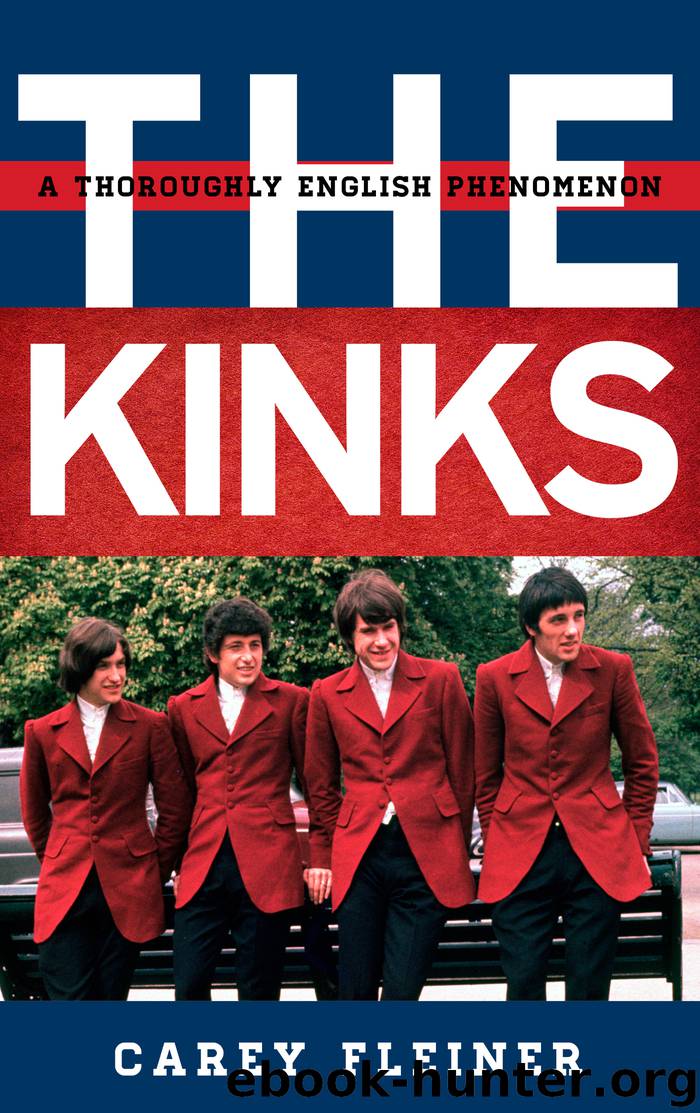The Kinks by Carey Fleiner

Author:Carey Fleiner
Language: eng
Format: epub
Tags: undefined
Publisher: Rowman & Littlefield Publishers
Published: 2012-05-21T16:00:00+00:00
Conclusion
There are a number of provocative aspects within the music of the Kinks, especially as shaped by Ray Davies’s songwriting as he explored themes of “the ambiguities of how one arrives at one’s self-identity.”[76] The Kinks, not as popular or scrutinized as the Beatles or the Rolling Stones when it comes to shock rock, cultural innovation, or subverting conventional mores (and morality) between the generations, were still a part of the Mod scene and subsequent challenges in youth-led entertainment.
It is a strange juxtaposition to look at these songs and then to read X-Ray—where Ray can speak quite cruelly of women and can be vulgar in places about sex and promiscuity in the rock star’s life. There is, arguably, a sense of detachment from the author and these descriptions—he makes it clear in the book that he says many of these cruel things to get a reaction from another character (who is, due to the complexities of narration in X-Ray, a younger version of himself). There persists throughout, however, an underlying desire and need for affection, nurturing, and comfort. If Ray or the Kinks are simply out to shock, perhaps such strange musings could be designed to get a reaction—from himself, fans, and interviewers. Ray’s own intelligence belies that he’s playing games, and he wants people to know that he’s playing games. As Rogan noted with the success of “Lola,” the commercial turnaround restored Ray’s confidence in that people were listening to his work, even if they were bewildered by what it meant.[77]
The Kinks certainly reflected social challenges to accepted norms of sexuality in their clothing, appearance, and performance from their early days of whips and leather to their pink hunting jackets (and Dave Davies’s mid-1960s briefly lived modeling career) and lazy vocals; but they lacked the same attitude toward appearance and consumer consumption pursued by the Mods. In Ray’s lyrics, one finds a mockery of the external feminine trapping of the masculine Mod scene, as he pokes fun at the “Carnabetian Army” in “Dedicated Follower of Fashion.” Instead, the sexual themes of the music are internalized and feminine—emotions, feelings, and desires outside the norms expected of 1960s British heterosexual men, and certainly ones not expressed without fear of reprisal. By casting his lyrics with deliberately obscure and ambiguous language, Ray slyly expresses his need for feminine security and longing for domestic comfort. A complex personality, Ray seems to have sought such comfort from childhood onward in whatever form—from female relatives to girls at school and groupies of all flavors—anyone who is gentle and maternal. Thus he casts his narrators in submissive, female roles, seeking comfort and protection while remaining clearly masculine.
1. Cf. Carey Fleiner, “Heroes and Villains: The Medieval Guitarist and Modern Parallels,” in The British Museum Citole: New Perspectives, British Museum Research Publication, ed. James Robinson and Naomi Speakman, 51–60 (London: British Museum, 2015).
Download
This site does not store any files on its server. We only index and link to content provided by other sites. Please contact the content providers to delete copyright contents if any and email us, we'll remove relevant links or contents immediately.
The Goal (Off-Campus #4) by Elle Kennedy(13673)
Kathy Andrews Collection by Kathy Andrews(11831)
Diary of a Player by Brad Paisley(7577)
Assassin’s Fate by Robin Hobb(6216)
What Does This Button Do? by Bruce Dickinson(6207)
Big Little Lies by Liane Moriarty(5804)
Altered Sensations by David Pantalony(5103)
Pale Blue Dot by Carl Sagan(5007)
Sticky Fingers by Joe Hagan(4198)
The Death of the Heart by Elizabeth Bowen(3620)
The Heroin Diaries by Nikki Sixx(3550)
Confessions of a Video Vixen by Karrine Steffans(3308)
Beneath These Shadows by Meghan March(3307)
How Music Works by David Byrne(3270)
The Help by Kathryn Stockett(3147)
Jam by Jam (epub)(3091)
Harry Potter 4 - Harry Potter and The Goblet of Fire by J.K.Rowling(3073)
Computational Linguistics and Intelligent Text Processing: 20th International Conference, CICLing 2019 La Rochelle, France, April 7â13, 2019 Revised Selected Papers, Part I by Alexander Gelbukh(2995)
Strange Fascination: David Bowie: The Definitive Story by David Buckley(2872)
